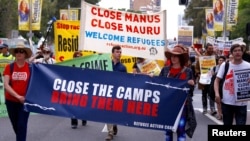Refugees arriving this week in Australia from Syria, Afghanistan and Myanmar will be given help under a new resettlement program. The migrants will be met by specially trained community support groups who will help them resettle and integrate into their new communities.
The $6 million Community Refugee Integration and Settlement Pilot initiative aims to assist 1,500 refugees in Australia over the next three years.
It will help new arrivals who do not have family links in Australia and will provide support and guidance for 12 months.
Officials have said the grassroots program will put new arrivals into immediate contact with other migrants and trained members of the Australian community.
Lisa Button, chief executive of Community Refugee Sponsorship Australia, a charity that helps new migrants, told the Australian Broadcasting Corp. that the resettlement initiative is significant.
“We are super-excited about this program, and it really is a new chapter in Australia’s refugee resettlement story,” she said. “There are so many benefits, both for the refugees and the Australian community and the volunteers who did this work. When refugees arrive, they arrive to a ready-made group of local supporters who are deeply invested in their success. So, those people meet them at the airport, they help them open bank accounts and enroll kids in school.”
Australia currently allocates about 14,000 humanitarian visas to refugees each year. The recently elected Labor government has said it hopes to eventually double Australia’s refugee intake.
Immigration has been a fundamental part of the Australian story since European settlement in 1788. Almost half the population of about 25 million people have a foreign-born parent, while a quarter of Australians were born overseas.
Australia's first refugees were from European countries in the World War II era. In the 1970s Australia resettled more than 55,000 Vietnamese. Since then, thousands of people from Afghanistan, Iraq, Iran and other countries have found sanctuary in Australia under official humanitarian programs.
However, asylum seekers who arrive by sea have been treated under different policies.
Since 2013 to 2014, people who have claimed asylum in Australia after coming by boat do not receive permanent protection.
They were previously incarcerated in Australian-sponsored camps in the South Pacific with no prospect of resettlement in Australia. The policy was condemned as cruel and inhumane by rights groups, but the government said it had prevented migrants from risking their lives at sea. Currently, unauthorized boat arrivals are deported or their boats are towed or turned away from Australian waters by the navy.
A detention center in Papua New Guinea has closed, and around 100 migrants remain on the island of Nauru.
Campaigners have said that the result of the May federal election that saw the center-left Labor party come to power is a clear sign that Australians want a more humane and compassionate country for refugees.







